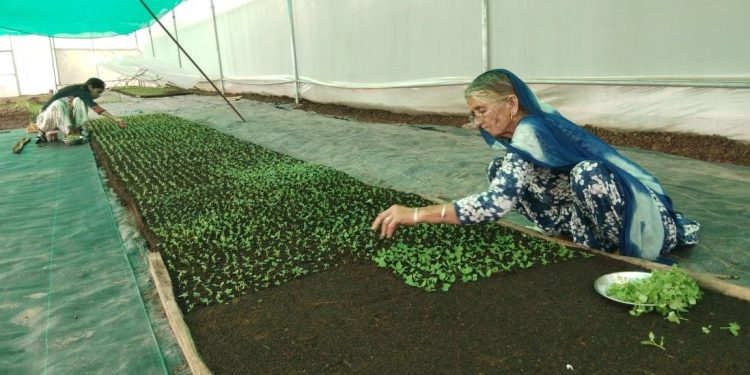Five years ago, the International Potato Center (CIP) introduced Apical Rooted Cutting (ARC) potato seed production technology in India, unaware of the profound impact it would have. What began as an innovative agricultural technique has evolved into a powerful force for women’s empowerment across the nation. From the southern state of Karnataka to the northeastern region of Meghalaya and even in Haryana, a state where women traditionally have limited involvement in agriculture, women have enthusiastically embraced ARC technology. In this article, we delve into the story of how ARC has transformed the landscape of Indian agriculture, with women leading the way.
The ARC Revolution:
The International Potato Center, in collaboration with the Potato Technology Center, embarked on a unique journey to develop a sustainable supply chain for ARC potatoes. This journey took them to the picturesque hilly terrain of Morni, located near Chandigarh. The decision to establish this hub was strategic, as the cooler climate during July to October provided ideal conditions for multiplying ARCs. These carefully nurtured plants were later transplanted to the plains in October, setting the stage for a remarkable transformation.
Women Taking the Lead:
In a surprising turn of events, it was not the male farmers but their wives who took the reins of ARC potato seed production in Haryana. Currently, 14 farmers are actively involved in multiplying ARCs within net houses, with husbands assuming a supportive role. In one heartwarming instance, a retired school teacher’s elderly mother enthusiastically participates in the process. When asked about this gender role reversal, the farmers explained that it simply evolved this way, highlighting the organic and spontaneous nature of this transformation.
The Driving Forces:
Several factors have contributed to the success of women in leading ARC potato seed production. First and foremost is the simplicity and accessibility of the technology itself. ARC production requires minimal resources and can be easily managed within the constraints of household responsibilities, making it an attractive option for women. Additionally, the support and guidance provided by organizations like CIP and PTC have played a crucial role in empowering women with the necessary knowledge and skills.
Economic and Social Impacts:
The adoption of ARC technology by women in Indian agriculture has yielded significant economic and social benefits. Women have not only gained financial independence but have also enhanced their decision-making power within their households. This newfound empowerment is reshaping traditional gender dynamics and fostering a sense of equality.
Challenges and Opportunities:
While the success of ARC potato seed production among women in India is commendable, it is not without its challenges. Access to resources and education remains a barrier for some women, limiting their participation. However, this also presents an opportunity for further investment in training and infrastructure to ensure more women can benefit from ARC technology.
Conclusion:
The introduction of Apical Rooted Cutting (ARC) potato seed production technology in India has led to an unexpected and inspiring transformation. Women, often marginalized in the agricultural sector, have taken center stage in this endeavor. The success story of women leading ARC production is not just about agriculture; it is a testament to the potential of gender equality and empowerment in rural communities. As we celebrate this remarkable journey, it is essential to continue supporting and expanding initiatives that empower women in agriculture, ensuring a brighter and more equitable future for all.
Tags: #AgriculturalEmpowerment #GenderEquality #ARCProduction #IndianAgriculture #RuralDevelopment #WomenInAgriculture #EmpoweringWomen #GenderRoles #EconomicImpact #SocialTransformation







